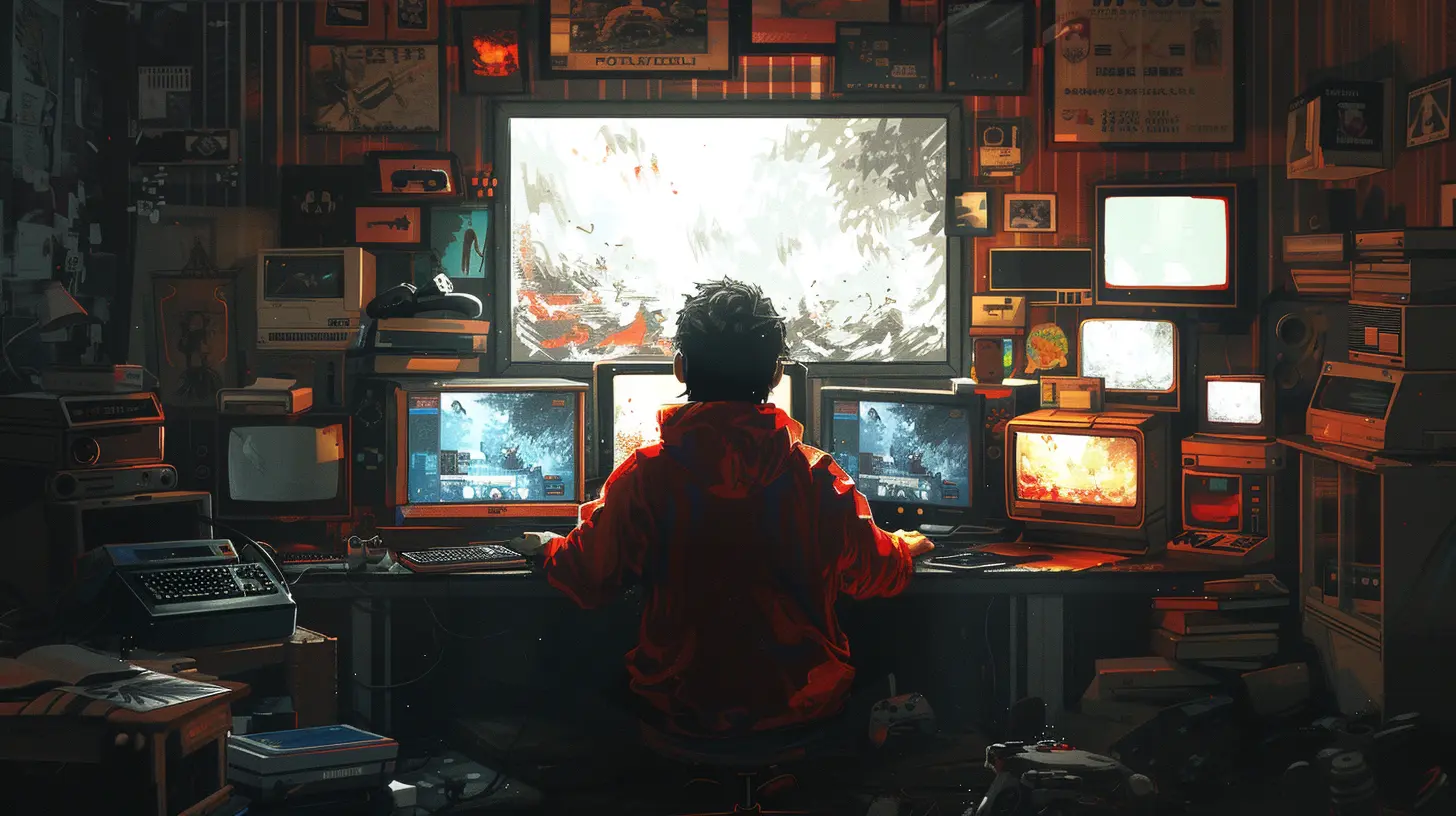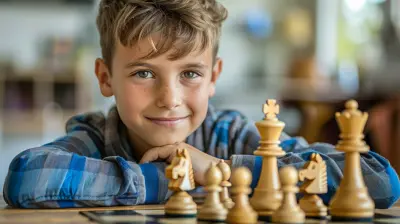The Psychology Behind Video Game Addiction
29 January 2025
Video games are a delightful escape, aren’t they? Whether you're racing against the clock, saving a virtual world from impending doom, or just harvesting crops on your digital farm, they provide a sense of accomplishment, relaxation, and fun. But here's the thing—sometimes, the thrill of gaming can morph into something so consuming that it becomes, well, an addiction. Ever wondered why some people just can’t seem to press pause? Let’s take a deep dive into the psychology behind video game addiction and see what’s really going on under the hood.
What Is Video Game Addiction?
First things first, let’s clear the air. Video game addiction, also referred to as gaming disorder, isn’t the same as simply loving games a bit too much. It’s when gaming starts to interfere with a person’s daily life—think skipping meals, losing sleep, or avoiding responsibilities because “just one more level” turned into an all-night marathon.The World Health Organization (WHO) even included “gaming disorder” in its International Classification of Diseases (ICD-11). It’s defined as a pattern of gaming behavior so intense that it takes over other aspects of life—relationships, job, school, health...you name it.
But how does this happen? Why do video games have such a tight grip on some individuals? Let’s break it down.
The Science of Reward: Why Games Are So Addictive
1. The Dopamine Rush
Ever noticed how good it feels when you level up? Or when you beat a tricky boss after countless retries? That’s dopamine at work. Dopamine is this little chemical in your brain that makes you feel good when you accomplish something. And guess what? Games are built to trigger dopamine over and over again.Think about loot boxes, achievements, or even that satisfying ding when you complete a quest. It’s all designed to give you a hit of dopamine, reinforcing the desire to keep playing. It’s like your brain screaming, "Do it again!" every single time you win.
2. The Reward-Punishment Cycle
Games are masters of teasing you with rewards just when you’re on the verge of giving up. Ever had a moment where you thought, “I’ll stop if I lose this round,” only for the game to give you a win? That’s no accident. Developers design games with a mix of wins and losses that keep you chasing that high, just like a slot machine in a casino.This reward-punishment cycle creates anticipation, making you wonder: “What’s next?” And before you know it, you’re hooked.
The Elements That Pull You In
1. Immersive Worlds
Video games aren’t just games—they’re experiences. They provide an escape from reality, a chance to be someone else and live in a different world. Whether it’s slaying dragons, building cities, or going on intergalactic adventures, games transport you to places where you feel powerful, important, and in control—things we don’t always feel in real life.For instance, if your day-to-day feels like a grind, wouldn’t it be tempting to log into a world where every effort is rewarded and your goals feel achievable? That’s the magic of immersion.
2. Social Connections
Gaming isn’t always a solo activity. Multiplayer games like Fortnite, Call of Duty, or World of Warcraft create spaces for social interaction. You team up, chat, and bond with people from around the globe, forming a sense of community.For some, these friendships become deeper than their real-life relationships. But what happens when the line between digital and real worlds gets blurry? It’s easy to prioritize gaming over physical social interactions when your teammates are counting on you.
3. Progression Systems
Ah, the sweet satisfaction of progress. Games are designed with progression systems that make you feel like you’re constantly improving. Whether it’s unlocking a new ability, earning rare gear, or reaching a higher rank, that constant sense of achievement keeps players coming back for more.Real life doesn’t always offer such clear-cut success indicators, does it? Games, on the other hand, make it easy for us to measure progress and feel accomplished.
The Psychological Triggers
1. Flow State
Ever heard of the term “flow”? It’s that magical zone where you’re completely absorbed in an activity, losing track of time. Games are excellent at inducing this state. With just the right balance of challenge and skill, they keep you engaged without overwhelming you.Think about it: In real life, achieving a flow state can be rare. But in a video game? It’s practically guaranteed.
2. Fear of Missing Out (FOMO)
Game developers know how much we hate missing out, and they use it to their advantage. Limited-time events, exclusive rewards, and seasonal passes are designed to create urgency. Miss playing the game now, and you might lose out on something forever. FOMO keeps players tethered to their screens, always logging back in to avoid being left behind.3. Competition and Ego-Boosting
We humans love to compete. Games tap into this by offering leaderboards, rankings, and player-vs-player modes. Every win boosts our ego, making us feel invincible. Conversely, every loss pushes us to try harder and prove ourselves. It’s a self-perpetuating cycle.Who’s More Prone to Gaming Addiction?
While anyone can fall victim to video game addiction, some people are more susceptible than others. Here’s why:- Age: Younger people, particularly teens, are more prone to gaming addiction. Their brains are still developing, making them more vulnerable to dopamine-driven activities. Plus, they often have fewer responsibilities, so it’s easier for games to take over their time.
- Personality Traits: People who are naturally impulsive or have difficulty managing time are more likely to get hooked. Introverts, too, may find solace in gaming as a way to escape social anxiety.
- Emotional Factors: Stress, depression, or loneliness can drive individuals toward games as a coping mechanism. The gaming world can offer a sense of control and purpose that real life might lack.
The Real-Life Consequences
Alright, let’s get real for a second. Video game addiction isn’t just “gaming gone overboard.” It comes with real-life consequences:- Physical Health: Long gaming sessions can lead to sleep deprivation, eye strain, and even repetitive strain injuries (hello, carpal tunnel syndrome).
- Mental Health: Gaming addiction is often linked to anxiety, depression, and lower life satisfaction.
- Relationships: Friends and family might start to feel neglected as gaming takes center stage.
- Productivity: Schoolwork, jobs, and personal goals can take a backseat when gaming becomes the main priority.
Can Gaming Addiction Be Cured?
Here’s the good news: Yes, it can. The first step is recognizing there’s a problem. From there, it’s about creating balance. Here are some tips:- Set Boundaries: Limit your gaming time each day and stick to it. Use alarms if you have to.
- Find Alternative Hobbies: Explore other activities that give you joy or a sense of accomplishment, like painting, hiking, or even learning an instrument.
- Seek Professional Help: If gaming feels out of control, don’t hesitate to reach out to a therapist. Cognitive-behavioral therapy (CBT) has been shown to be effective for gaming addiction.
- Reconnect with the Real World: Spend more quality time with family and friends in person. It’s easier to break the addiction when you have a support system.
Wrapping It Up
Video games are incredible—they entertain, challenge, and connect us. But, like anything else, too much of a good thing can be harmful. By understanding the psychology behind video game addiction, we can make informed choices and strike a balance between gaming and everything else life has to offer.So, the next time you feel the pull of a never-ending gaming session, ask yourself: “Is it time to press start on something new?
all images in this post were generated using AI tools
Category:
Gaming CultureAuthor:

Tayla Warner
Discussion
rate this article
8 comments
Shannon Coffey
Great article! You’ve really captured the complexity of video game addiction. Understanding the psychological triggers is crucial for both players and developers in fostering healthier gaming habits. Looking forward to more insights!
March 29, 2025 at 6:11 PM

Tayla Warner
Thank you so much for your thoughtful feedback! I’m glad you found the article insightful. Stay tuned for more discussions on this important topic!
Sadie McGillivray
Video game addiction isn't a flaw; it's a testament to games' immersive power. Instead of demonizing players, let's explore how these experiences captivate us and what that says about our needs and desires.
February 15, 2025 at 4:05 AM

Tayla Warner
You raise an interesting point! Understanding the allure of video games can reveal a lot about human psychology and our fundamental desires for connection, achievement, and escapism. Exploring this immersion can lead to healthier conversations about gaming habits.
Rayna Bishop
Thank you for shedding light on such an important topic. Understanding the psychological aspects of video game addiction is crucial for players and their loved ones. This article offers valuable insights that can help foster healthier gaming habits. Well done!
February 14, 2025 at 6:03 PM

Tayla Warner
Thank you for your kind words! I'm glad you found the article insightful and helpful.
Nymira Hughes
Great insights! Understanding the psychological factors behind gaming addiction is crucial for fostering healthier gaming habits. It’s important to balance enjoyment with awareness, promoting a positive gaming experience for all players. Keep it up!
February 3, 2025 at 3:45 AM

Tayla Warner
Thank you for your kind words! I completely agree—balancing enjoyment with awareness is key to fostering healthier gaming habits.
Ezra McCool
Great article! It’s fascinating to dive into the psychology behind video game addiction. Understanding the triggers and motivations can really help players maintain a healthy balance while enjoying their favorite games. Looking forward to more insights on this topic!
February 2, 2025 at 5:37 PM

Tayla Warner
Thank you for your feedback! I'm glad you found the article insightful. Stay tuned for more on this important topic!
Kenna Underwood
This article offers valuable insights into the psychological factors driving video game addiction. While it's important to recognize the potential negative impacts, it’s equally vital to consider the positive aspects of gaming, such as community and skill development.
January 31, 2025 at 3:43 AM

Tayla Warner
Thank you for your thoughtful comment! I completely agree—while it's crucial to address the negatives of gaming addiction, acknowledging its positive aspects, like community building and skill development, enriches our understanding of the overall impact of gaming.
Serenity Warren
Video game addiction? I prefer to call it 'advanced strategic life prioritization'!
January 29, 2025 at 4:42 PM

Tayla Warner
That's a clever perspective! While gaming can offer valuable skills, it's essential to find a balance to maintain overall well-being.
Diana Carey
Video game addiction reflects deep psychological needs; understanding it can enhance player experience and mental health awareness.
January 29, 2025 at 5:00 AM

Tayla Warner
Thank you for your insightful comment! Addressing the psychological needs tied to video game addiction is crucial for both enhancing player experiences and promoting mental health awareness.
MORE POSTS

Game Preservation: The Role of Open Platforms Like PC in Keeping Classics Alive

The Role of Storytelling in Child-Friendly Games

How to Encourage Critical Thinking Through Games

How Artistic Expression Shapes Indie Game Graphics

Behind the Scenes: How Gaming Tournaments Are Organized

Exploring Realism in Sandbox Games: How Close Are We to True Simulations?